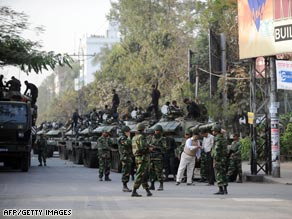
The Bangladeshi army resumed its search Friday for missing military officials inside an expansive paramilitary forces compound that had been the site of a deadly two-day standoff.
More than 130 officers were unaccounted for, said Cmdr. Abdul Kalam Azad with the Rapid Action Battalion (RAB), an elite internal security team. By Friday morning, it was still not clear how many people had died during the standoff inside the headquarters of the Bangladesh Rifles (BDR) paramilitary force in the capital, Dhaka. At least 20 deaths have been confirmed, Azad said. Many of the victims had been shot and their bodies dumped down sewers. The bodies floated down rivers for miles before they were spotted. All of them had on uniforms, officials said. The city’s water department said it would pump water into sewage lines that lead from the headquarters to flush out any bodies that might be trapped inside. At the time of the rebellion, 168 army officers and 11,000 BDR troops were inside.
Don’t Miss
Bangladesh: Rebellion ends
Meanwhile, RAB forces arrested about 150 BDR troops who fled their barracks when their comrades agreed to lay down arms after the standoff ended Thursday. The troops had donned plain clothes and fled to various parts of Dhaka, where they were arrested, Azad said. Others had agreed to surrender their weapons after Bangladeshi Prime Minister Sheikh Hasina said she would grant them amnesty. Watch how paramilitary revolt has spread » “We were told by the army that we should apprehend anyone who tried to escape,” Azad said. The standoff started Wednesday when paramilitary troops rebelled against their commanders. The Rifles are responsible primarily for guarding the country’s borders. The force, more than 65,000-strong, also takes part in operations such as monitoring polls. The BDR comprises recruits, whose commanding officers are military officers.
Discontent had been bubbling for years, with those in BDR ranks complaining that army superiors dismissed their appeals for more pay, subsidized food and opportunities to participate in U.N. peacekeeping operations — which pay far more than what recruits make at home. Bangladesh and its South Asian neighbors contribute the most troops to U.N. peacekeeping operations.